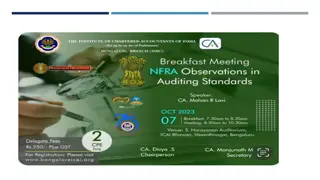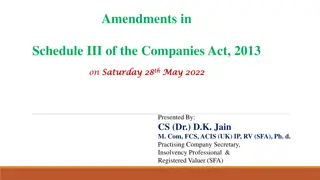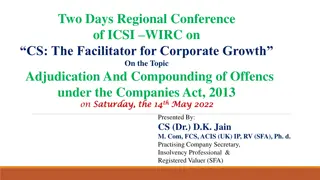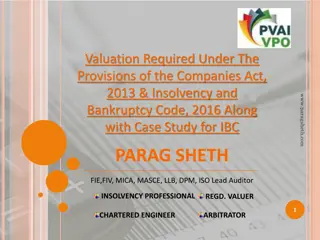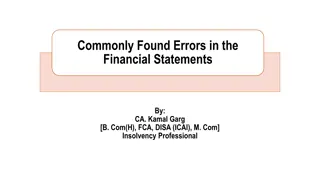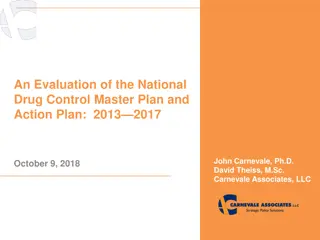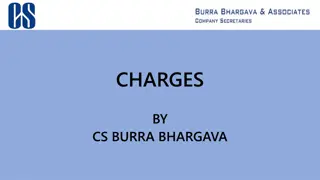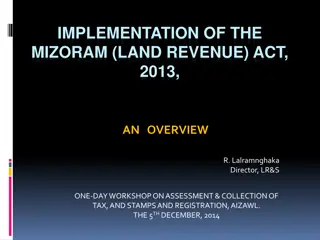Understanding Automatic Inference of Necessary Preconditions
This content delves into the concept of automatic inference of necessary preconditions in software development, emphasizing the importance of necessary preconditions over sufficient preconditions for ensuring program correctness. It discusses the distinction between necessary and sufficient preconditions, implementation in Clousot, precision improvements, and examples highlighting the impact of different types of preconditions on code behavior.
Download Presentation

Please find below an Image/Link to download the presentation.
The content on the website is provided AS IS for your information and personal use only. It may not be sold, licensed, or shared on other websites without obtaining consent from the author. Download presentation by click this link. If you encounter any issues during the download, it is possible that the publisher has removed the file from their server.
E N D
Presentation Transcript
De necessariispre condicionesconsequentia sine machina P. Consobrinus, R. Consobrinus M. Aquilifer, F. Oratio
Automatic inference of necessary preconditions P. Cousot, R. Cousot M. Fahndrich, F. Logozzo
The paper in one slide Problem: Automatic inference of preconditions Define: What is a precondition? Sufficient precondition: if it holds, the function is correct Necessary precondition: if it does not hold, the function is definitely wrong When automatic inference is considered, only necessary preconditions make sense Sufficient preconditions impose too large a burden to callers Necessary preconditions are easy to explain to users Implementation in Clousot Precision improvements 9% to 21% Extremely low false positive ratio
Example int Example1(int x, object[] a) { if (x >= 0) { return a.Length; } return -1; } Sufficient precondition: a != null Too strong for the caller No runtime errors when x < 0 and a == null Clousot users complained about it wrong preconditions
Example void Example2(object[] a) { Contract.Requires(a != null); for (var i = 0; i <= a.Length; i++) { a[i] = F(a[i]); if (NonDet()) return; } } Sufficient precondition: false It may fail, so eliminate all runs Necessary precondition: 0 < a.Length If a.Length == 0 it will always fail Necessary precondition is weaker than the weakest precondition!!!
Program semantics Program traces: T = G B I G = good traces, terminating in a good state B = bad traces, terminating in an assertion violation Assertions: Language-induced: division by zero, null pointers, buffer overrun User-supplied annotations: assertions, preconditions, postconditions, object invariants I = infinite traces, non-termination Notation: X(s) are the traces starting with s
Necessary and sufficient In S N we say that S in a sufficient condition for N N is a necessary condition for S For a program P A condition S is sufficient if its truth ensures that P is correct A condition N is necessary if its falsehood ensures P is incorrect
Weakest (liberal) preconditions Provide sufficient preconditions guaranteeing partial correctness: wlp(P, true)(s0) (B(s0) = ) Drawbacks of wlp for the automatic inference of preconditions: 1. With loops, there is no algorithm to compute wlp(P, true) Solution in deductive verification: Use loop invariant 2. Inferred preconditions are sufficient but not the weakest anymore Under-approximation of loops 3. Sufficient preconditions rule out good runs Callers should satisfy a too strong condition
Example Overflows are not Ex. Sum([-2147483639, 2147483638, -10]) = 19 not an error int Sum(int[] xs) { Contract.Requires(xs != null); int sum = 0; for (var i = 0; i < xs.Length; i++) sum += xs[i]; In deductive verification, provide loop invariant Which is the weakest precondition? The method itself Sufficient preconditions: i [0, xs.Length], 0 xs[i] < MaxInt/xs.Length or xs.Length == 3 xs[0] + xs[1] == 0 xs[2] >= 0 or . Contract.Assert(sum >=0); return sum; }
Under-approximation of wlp Formally, with loop invariants, we compute a sufficient condition S: S(s0) wlp(P, true)(s0) Which is equivalent to [I(s0) = ] [S(s0) G(s0) ] So that it may exists some initial state s such that S(s) G(s) i.e., s does not satisfy S, but it does not lead to a bad state
Consequences Sufficient preconditions impose too large a burden to the caller They just ensure the correctness of the callee Not practical in a realistic setting Users complained about wrong preconditions wrong preconditions = sufficient preconditions
Necessary preconditions
Strongest necessary preconditions If the program terminates in a good state for s0thenN(s0) should hold: [I(s0) = ] [G(s0) N(s0)] Equivalently [I(s0) = ] [ N(s0) (G(s0) = B(s0) )] i.e., if N does not hold, either The program diverges, or The program reaches a bad state Strongest (liberal) necessary precondition: snp(P, true)(s0) [G(s0) = B(s0) ]= [G(s0) B(s0) = ]
Comparison, ignoring non-termination Weakest sufficient preconditions Strongest necessary preconditions G(s0) G(s0) S(s0) N(s0) true true true true B(s0) B(s0) false false false false true true
Approximation of necessary conditions Static analyses to infer an error condition E such that E(s0) [G(s0) = B(s0) ] i.e., E is sufficient to guarantee the presence of definite errors or non-termination E is an under-approximation of the error semantics The negation, E = N is weaker than the strongest (liberal) necessary precondition: G(s0) B(s0) = E(s0)
Main Algorithm Iterate until stabilization For each method m Analyze m using the underlying static analysis Collect proof obligations ? Use the analysis to prove the assertions in ? Let ? ? be the set of warnings If ? then Infer necessary preconditions for assertions in ? Simplify the inferred preconditions Propagate the necessary preconditions to the callers of m
Static analyses for the inference All-Paths precondition analysis Hoists unmodified assertions to the code entry Conditional-path precondition analysis Hoist assertions by taking into account assignments and tests Use dual-widening for loops Dual-widening under-approximates its arguments Quantified precondition analysis Deal with unbounded data structures
Examples All-paths infers a != null int FirstOccurence(int[] a) { int i = 0; while (a[i] != 3) i++; Conditional-paths also infers a.Length > 0 (a[0] != 3 a.Length >1) Quantified infers j [0, a.Length]. a[j] == 3 return i; } Details in the paper
Simplification We can infer many preconditions for a given method Simplification allows reducing them Key to scalability Pretty print preconditions for the user Simplification is a set of rewriting rules to iterate to fixpoint Examples P, [b a], [ b a] P, [true a] P, [true a] P, a
Code Contracts static checker Clousot/cccheck static analyzer for .NET Downloaded more than 80,000 times Use preconditions/postconditions to reason on method calls Suggest and propagates inferred preconditions and postconditions Users complained about sufficient preconditions Starting point for this work
Experimental results Un-annotated code (.net base libraries) All paths analysis Infer 18,643 preconditions Simplification removes >32% Conditional path analysis Infers 28,623 preconditions Simplification removes >24% Similar results for partially annotated code (Facebook C# SDK) Conditional path analysis is more precise but up to 4x slower than all-paths analysis Because of inferred disjunctions
Precision Number of inferred preconditions is not a good measure We are interested in the precision, i.e., fewer methods with warnings Precision gain is between 9% (framework libraries) and 21% (facebook C# SDK) Missing preconditions public surface are errors The library does not defend against bad inputs On mscorlib, the core library of .Net, we found 129 new bugs Only one one false positive Because of exception handling in clousot
Sic transit gloria mundi The violation of a necessary precondition guarantee a definite error When automatically inferring preconditions, only necessary preconditions make sense Sufficient preconditions are too strict for callers Advantages Easy to explain to the users Provide chain leading to errors No false positives Implemented, and used in a widely downloaded tool (Clousot/cccheck)



